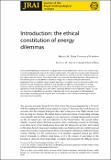Introduction : the ethical constitution of energy dilemmas
Abstract
Growing anthropological research on energy provides critical explorations into the cross‐cultural ways in which people perceive and use this fundamental resource. We argue that two dominant frameworks animate that literature: a critique of corporate and state power, and advocacy for energy transitions to less carbon‐intensive futures. These frameworks have narrowed the ethical questions and perspectives that the discipline has considered in relation to energy. This is because they are animated by judgements that can implicitly shape research agendas or sometimes result in strong accusations that obscure how our interlocutors themselves may consider the rightness and wrongness of energy resources and the societal infrastructures of which they form a part. We propose a more capacious approach to studying energy ethics that opens up energy dilemmas to ethnographic inquiry. As such, we show how energy dilemmas constitute important sites for the generation of anthropological knowledge, encouraging more insightful and inclusive discussions of the place of energy in human and more‐than‐human lives.
Citation
High , M M & Smith , J M 2019 , ' Introduction : the ethical constitution of energy dilemmas ' , Journal of the Royal Anthropological Institute , vol. 25 , no. S1 , pp. 9-28 . https://doi.org/10.1111/1467-9655.13012
Publication
Journal of the Royal Anthropological Institute
Status
Peer reviewed
ISSN
1359-0987Type
Journal article
Description
This project has received funding from the European Research Council (ERC) under the European Union's Horizon 2020 research and innovation programme under grant agreement No 715146. The authors also acknowledge the funding received to carry out the research from the Leverhulme Trust (ECF‐2013‐177), the British Academy (EN150010 and VF1101988), the National Endowment for the Humanities, and the National Science Foundation (1540298).Collections
Items in the St Andrews Research Repository are protected by copyright, with all rights reserved, unless otherwise indicated.

